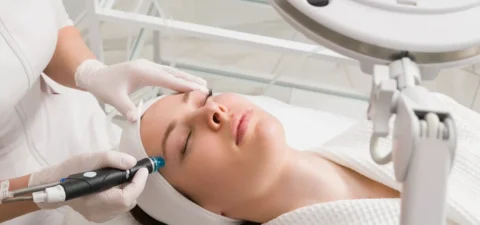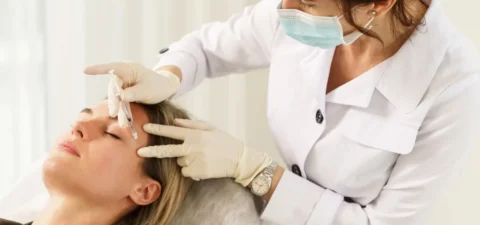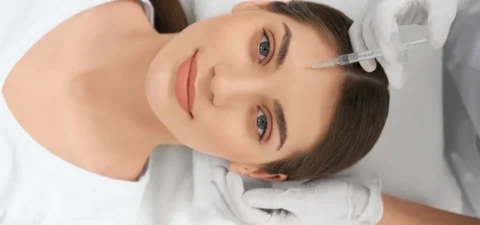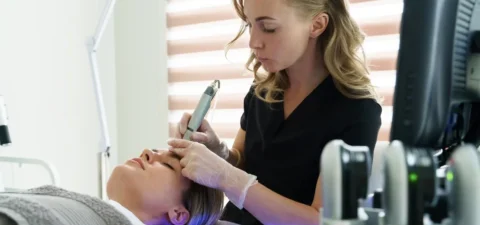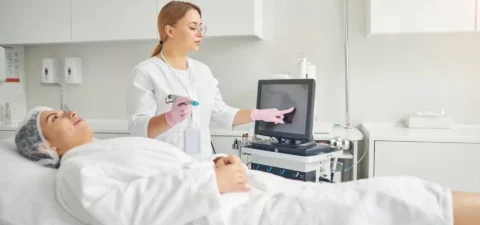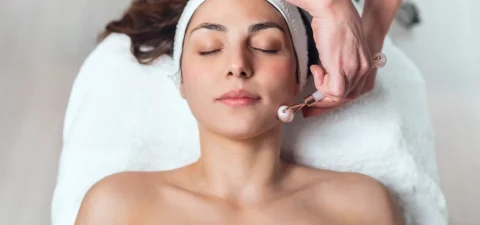All content in this blog is for informational purposes only. It is not medical or legal advice. Please consult with a lawyer or a medical professional.
Self-care and wellness is becoming a popular topic among men and women, which emphasizes the growing need for esthetic professionals. If you’re interested in practicing esthetics and you want to get the most out of this career, it’s important to consider the location to practice esthetics services. How much an esthetician makes varies greatly depending on their location.
If you’re an aspiring esthetic professional who’d like to start a career in Pennsylvania, you might be wondering: how can I become an esthetician in PA? The good news is that an esthetician license in Pennsylvania only takes the completion of a 300-hour licensed esthetics program training, as well as passing the written and practical exams.
How to Become an Esthetician in PA
Esthiology is gaining new respect among the medical community as demand for medical esthetician services begins to rapidly increase. However, location is among the biggest factors to consider if you want to have a thriving career in esthetics. So if you’re an aspiring esthetic professional in Pennsylvania, you can make as much as $36,220 annually.
The licensure for esthetics in the state is regulated by the Pennsylvania State Board of Cosmetology. So before you can have a license to practice esthetics in Pennsylvania, you must first go to an esthetician school and accomplish the following requirements:
- License in esthetics program
- 300-hour esthetician training
- Passed written exam (via Pearson VUE)
- Passed practical exam
But to be eligible for a spot as a student in an esthetician school, you must adhere to all of the standard requirements for the esthetician licensure program and training such as the following:
- Must be 16 years of age
- High school diploma holder or GED
- Valid ID photo for proof of identification
- Social security card for proof of citizenship
- Taken a preliminary exam
- Passed a drug screening test
How Many Hours is Required for Esthetician School in Pennsylvania?
The state requires 300 hours of skin care instruction and esthetician training from a licensed school of cosmetology. The 300-hour licensed esthetician program is required to be approved by the Pennsylvania Board of Cosmetology. Aside from that, this program is a combination of theoretical knowledge on esthetics as well as practical training.
How Long Does it Take to be an Esthetician in Pennsylvania (Full time)?
Pennsylvania only requires a minimum of 300 hours of instruction and training in skin care. How long this will take depends on whether you attend part-time or full-time. If you opt to attend the program full-time, then you can become a knowledgeable specialist in skin care within 3 to 5 months.
Full-time students in esthetician school may opt to have their classes in the evening and weekend. They may also choose to dedicate up to 35 hours per week on studying or practicing aesthetics, depending on their choice.
Esthetic programs include esthetician training, which provides a deeper understanding of skin care. Alongside skincare concepts are other matters that are pertinent to being a master esthetician which are the following:
1) Sanitation techniques
Learn the best practices in sanitary workstation set-ups, equipment handling, and makeup storing. This also covers sanitary requirements on procedures to maintain the quality of your services.
2) Human physiology and skin analysis
This will help an esthetics student have a better understanding of what to watch out for when it comes to the medical history of your clients to avoid any adverse effect on the esthetics treatments and services you will perform.
This also covers skin conditions and common disorders to help patients identify and recover from such skin issues. It also guides estheticians on how to perform services that may damage sensitive skin such as hair removal procedures.
3) Ingredient Guide
Beauty school will guide an esthetics student through the necessary insights you need regarding the ingredients in skincare products to be able to effectively carry out treatments for skin healing or improvement.
4) State laws on esthetics
To maximize safety of handling clients, you need to adhere to the regulations and laws on health and safety, which allows you to have a full idea on how to interact with them to safeguard your freedom from any possible liabilities.
5) Professional business skills
Whether you’re employed or self-employed, you’ll thrive more as an esthetics professional if you know how to manage customer relationships. Some business concepts that will be covered in esthetician school include sales and marketing, health insurance, and salon management.
How Much Will it Cost me to be an Esthetician in PA?
The national average cost to become an esthetician is around $3,000 to $10,000. This depends on your state which dictates the required training hours and the length of the program. In Pennsylvania, the licensure esthetics program and training may only cost around $5,977, which is within the national range.
Pennsylvania doesn’t require you to attend an accredited esthetician or cosmetology school for an esthetician license. However, attending esthetician schools that are accredited by the National Accrediting Commission will boost your credibility as an esthetician. Some of these accredited beauty and wellness career schools in Pennsylvania are the following:
- Metro beauty academy
- Douglas education center
- Venus beauty academy
- Empire beauty school
- Esthetician license
- Altoona beauty school
If you think the costs are too unattainable for your budget, you may seek financial aid programs provided by Federal Student aid, which is under the U.S. Department of Education.
How Much Does Esthetician Cost in Pennsylvania
According to the United States Bureau of Labor Statistics, a full-time employed esthetician in the state of Pennsylvania can earn as much as $36,220 per year. This translates to an average hourly rate of $17.41 per hour, which doesn’t include the tips and commissions that are commonly received by these professionals.
What Services May Estheticians Provide in Pennsylvania?
Estheticians are licensed skin care specialists who may apply skin treatments to improve skin condition because they specialized in both ingredient and skin analysis. They may also perform more advanced skin treatments and procedures that even holders of a cosmetology license aren’t authorized to perform.
Licensed esthetician job services in Pennsylvania include the following services:
- Massage therapy
- Cleansing and toning services
- Cosmetic application
- Facials
- Superficial chemical peels
- Body treatments
- Skin conditioning
- Blemish extraction
- Lash extensions
- Makeovers (i.e, Makeup application)
- Hair removal services (i.e, waxing, laser hair removal)
If you’re wondering why manicure and pedicure isn’t included in the list, it’s because you need a separate license to be authorized to perform such services.
Aside from those mentioned, esthetic professionals who work in clinical settings are called a medical esthetician. A medical aesthetic professional helps people address the effects of an underlying health condition on their skin.
Tips to Success: How to Make Money as an Esthetician in Pennsylvania
Professional business skills are taught in beauty school. But aside from complying with the requirements of the state, you can further step-up your competitive advantage and make more money as an esthetician in Pennsylvania.
1) Never Stop Learning: Learn Specialty Courses
You may kickstart your esthetic career journey by learning specialty courses to provide specific treatment services that aren’t included in the esthetician program and training such as the following:
- Aromatherapy
- Microdermabrasion
- Innovative spa therapies
- Advanced acne treatment
- Makeup tattooing
- Other hair removal techniques
- Other nail technology services
Aside from adding more knowledge, you may also focus on enhancing a single specialty that’s already taught to a student in esthetician school by a cosmetology instructor.
2) Find Your Own Path: Build Your Own Business
Depending on the cost of opening a business, you may also opt to be self-employed. On the national scale, if you’re a self-employed esthetician in the U.S, you’re most likely to have the potential to earn more money, which may range between $50,000 to $74,000.
If you think you have what it takes to start your own business to practice your esthetics expertise, then you should. You can start a medical aesthetic clinic or venture out as a makeup artist. Aside from those, you may also opt to share your knowledge as a cosmetology instructor.
3) Aim Higher: Be a Master Esthetician
Master estheticians are the highest qualified esthetic professionals which uses the depth of their skills and experience as a competitive advantage. Some estheticians are continuing education through courses to deepen their knowledge on esthetics and skin analysis while some have developed their expertise through intensive experience or apprenticeship as a skin care specialist.
Be Equipped with Esthetics Expertise through High-Quality Courses from FACE Med Store
Having an esthetician license in Pennsylvania requires you to attend a 300-hour esthetician program and training in an accredited esthetician school. Compared to other states that require 600 hours, this is a good option for those who already want to start their esthetician career services.
FACE Med Store is a trusted partner for your growth as a skin care and wellness professional. We want our partners to be equipped with the right knowledge to serve their customers better and thrive in their respective ventures. Browse our website today for all your training course and supply needs.
